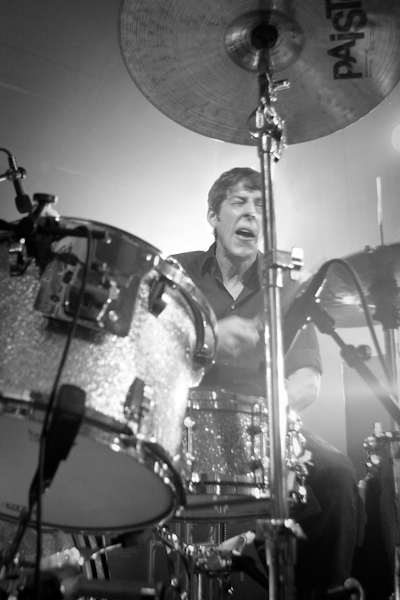Band of Brothers: The Black Keys

PHOTOS BY ANTWAN DUNCAN
One of the most important things to know about the Black Keys is that they are from Akron, Ohio, the unglamorous city best known for its rubber plants and the grime, sweat, and hard work that are their symbolic byproducts. The blues rock duo, who proudly titled their third album Rubber Factory several years ago, are the first to admit those geographical roots are central to their band’s identity. “Growing up in Akron made us bitter,” says singer Dan Auerbach. “But it also made us competitive and hard-working.”
Over the course of six albums (and occasional side projects), the Black Keys have explored a primordial, sludgy style, soundtracks to so-called blue-collar anguish, human frustration, and hope at large. A million album sales later, the Keys are set to release Brothers (Nonesuch), an album named for the bond its troubled but rewarding creative process triggered. These new songs see the band achieve new levels of hybridity, as they skillfully incorporate elements of soul, psychedelia, and even hip-hop into their earthy sound.
As the Black Keys played a secret show Saturday night, which was part of the New York leg of the Kin Spot Tour, Interview caught up for a chat with the band, who were in high spirits on the eve of Brothers‘ release.
COLLEEN NIKA: Can you describe the recording process for Brothers?
PATRICK CARNEY: It was a pretty compact process. We started recording last summer, beginning on August 15 and finishing on August 26. Dan [Auerbach] had lyrics ready, and everyday we recorded one song. We just made the music, and if the song sucked, we would move on. 15 songs made it.
NIKA: Why did you record in Alabama?
DAN AUERBACH: We needed to get out of town! And we wanted to go to a classic studio. So we chose Muscle Shoal Sounds… And it was, well, classic.
NIKA: You’ve recorded in abandoned buildings in Akron, too. You are drawn to recording in desolate locations.
CARNEY: We definitely do. I think for a long time we did that because it was cheaper.
AUERBACH: But this time we did it… because it was cheaper.
[BOTH LAUGH.]
NIKA: I can imagine the environment in which you record would affect your mood.
CARNEY: Yeah. Well, in this case, we were being fed, like, only home-fried food, really awful coffee, and shitty, shitty weed. That said, it was fun making the music itself.
AUERBACH: It was beautiful there—
CARNEY: But not really “fun.” There’s nowhere to go at night. You have restaurants, basically. So, that sense of boredom probably did influence the album.
NIKA: How is this album an evolution from past Black Keys’ albums?
CARNEY: The main difference is that we didn’t used to go into recording with a plan. We wouldn’t be sure what we wanted to do or how to do it; with [2008’s] Attack & Release we had an idea of what we wanted, and we experimented with layering stuff for the first time. Having finished that record and toured for two years, we came into this one as stronger musicians. We could see more clearly how to complete a song, how to achieve a desired effect without overdoing it.
NIKA: Were there any new sources of inspiration you found yourself channeling here?
AUERBACH: We listened to a lot of hip-hop while we recorded this album. Some of our new material literally rips off hip-hop songs.
NIKA: Is the hip-hop influence a carryover from last year’s Blakroc hip-hop side project?
AUERBACH: Yeah. The Blackroc project was about us building up very minimal beats with atmospheric melody. It was spring training for the new Black Keys’ album.
NIKA: Do you see any similar collaborative efforts in the future? Another genre, maybe?
AUERBACH: I don’t know; I don’t know what other genre we’d be into.
CARNEY: We could make a Brazilian jazz record.
AUERBACH: A Brazilian Jiu-Jitsu-inspired record. [LAUGHS]
NIKA: Akron doesn’t seem like the most exciting musical hub in the world. But a lot of amazing bands like Devo and The Pretenders have Akron roots.
CARNEY: There’s a lot of cool people there. There’s also not much to do. It kind of forces you to make your own fun. Right now, there’s a small scene, but it’s being hit really hard by the recession–it’s rough there. You have to work hard to survive.
NIKA: On that note, I once read your goal as artists was to be able to pay your rent with your art. Has that happened?
AUERBACH: Yes, and it’s amazing. That’s the indie dream—actually, that’s the American dream–to be comfortable. We’ve already exceeded any expectation I’ve ever had.
NIKA: Switching gears, I’ve heard rumors that the official video for “Tighten Up” involves children and is quite unique.
AUERBACH: Oh yes. We act in it. It is Pat’s official “acting debut.”
CARNEY: I play a single mom. With a drug habit. [LAUGHS]
CARNEY: It’s going to be like the “Jeremy” video, you know?
AUERBACH: No, it’s not a music video. It’s a Lifetime movie.
CARNEY: Sally Struthers directed it. And it’s going straight to DVD.
Brothers is released tomorrow. On Wednesday, the Black Keys will debut their new songs live at a one-off performance at New York City’s Housing Works café, where they also will host a two-day pop-up shop. On Thursday, they open for Pearl Jam at Madison Square Garden.






